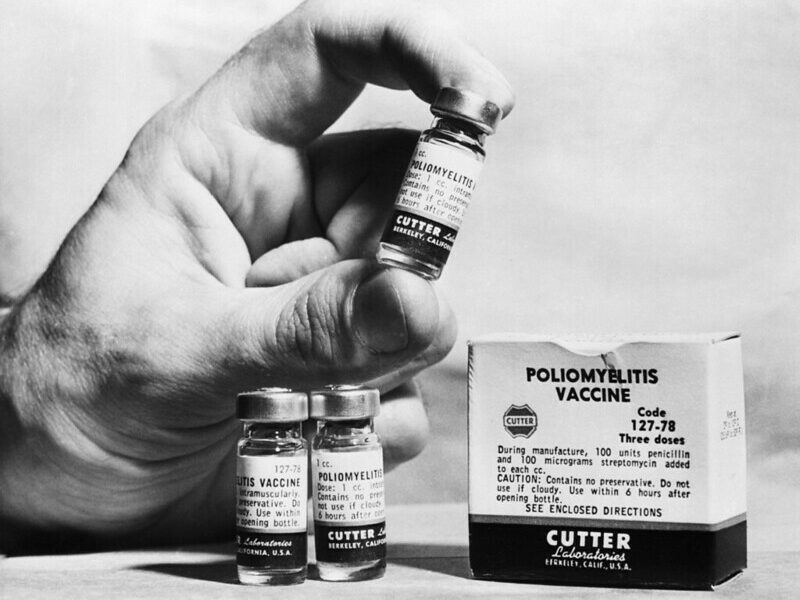In 2012, an estimated 122 of the 223 global cases of polio occurred in Nigeria, more than half of the cases worldwide (1,3). Worldwide efforts to eradicate the poliovirus have come a long way since 2012. Nigeria had not reported any polio cases since 2014, and was removed from the polio-endemic list by the World Health Organization in September of 2015 (4). However, in August 2016, two cases of polio emerged in the Borno state of Nigeria. These two children were paralyzed as a result of contracting the wild poliovirus, which is polio occurring naturally and not due to complications of vaccination. On September 6th, 2016 a third case of the poliovirus in a 24-month old boy was detected (2). This recent emergence of polio cases highlights a substantial setback to the progress of the eradication program in Nigeria over the past several years.
Background on Polio
Polio is a communicable disease caused by poliovirus, of the genus Enterovirus (6). It is transmissible from person-to-person through contact with feces or droplets from a sneeze or cough from an infected person (6). Polio primarily affects children under the age of three, but can potentially infect anyone (7). About 72 out of 100 people infected with poliovirus do not exhibit any symptoms (6). One out of four people infected with the virus will experience flu-like symptoms including fever, sore throat, upset stomach, headache, and fatigue (6). Less than 1% of people infected with the virus experience paralysis, which can cause death if the paralysis affects muscles that are necessary to help them breathe (6,7).
Poliovirus is preventable through vaccination. The two types of vaccination that exist are inactivated polio vaccine and modified-live, oral polio vaccine (7). As a result of these prevention measures, all countries in the world have been deemed “polio-free” from wild poliovirus except for Afghanistan, Pakistan, and most recently, Nigeria (1).
The Problem
Nigeria was on the brink of polio eradication. The last reported case before the summer of 2016 was two years ago in July of 2014 (1). Yet, unfortunately, the recent cases of polio in Nigeria occurred just short of when the Global Polio Eradication Initiative (GPEI) was going to announce Nigeria as polio-free in 2017, which occurs when there are no polio cases for at least three years. (8). Now, with the recent outbreak, Nigeria will not be certified as polio-free until at least 2019 (8).
There have been two significant barriers to the eradication of poliovirus in Nigeria. The first major obstacle to eradicating the disease has been the instability and insecurity of the Northern regions under the control of Boko Haram, a Nigerian Islamist terrorist group. The terrorist group has publicly advocated against the usage of vaccinations claiming that it is a “Western plot” against Nigerian children (3). They have continuously made it extremely difficult for vaccination teams or government health officials to enter into their territories to vaccinate their hard-to-reach child populations over the past few years (3). As a result of Boko Haram’s efforts, half a million children did not receive the polio vaccination in the Northern regions (9). Not surprisingly, the most recent 2016 polio cases have been children from the Borno region and the border of Chad, two of the Northern regions, previously controlled by the terrorist group (9).
The insecurity of the Northern regions of Nigeria has also interrupted adequate surveillance of the disease, the second major impediment to eradicating polio. The insufficient surveillance of polio has enabled the disease to go undetected. According to the United States Center for Disease Control, two of the most recent cases were of a viral strain similar to one last seen in 2011, indicating that the virus had likely been circulating undetected for years (2,10). This new information sheds critical light on the ability of polio to remain undetected rather than to re-emerge. It is essential that governing bodies of the polio eradication efforts take this into consideration for future control endeavors. Some polio experts are rethinking labeling a country as “polio-free” after only three years given this recent discovery. Respectively, polio eradication workers are hoping to use this current situation in Nigeria as a “wake-up call” to ensure that future polio eradication campaigns be executed with better long-term surveillance plans (2,10).
What is Being Done Now
The government of Nigeria is addressing this outbreak with plans of vaccination campaigns. The government plans to vaccinate about five million children in the next few weeks (5). With recent military action, many communities in the Northern territories of Nigeria are now liberated from Boko Haram’s control (3). This enables vaccinators to enter these previously inaccessible territories and making it easier to reach the government’s vaccination goal. However, Nigeria still plans on vaccinating children under five who remain in unstable, terrorist-controlled, areas. The campaigns are airlifting vaccinators via helicopter to these unstable areas to avoid usage of unsafe roads (10). To help Nigeria accomplish its goal of five million vaccinated children, the World Health Organization is deploying some of its staff and polio eradication resources (11). Additionally, the GPEI is providing Nigeria with significant support as a result of this recent outbreak (11).
Nigeria is doing everything that it can to contain and prevent further spread of the wild poliovirus. One can only hope that these vaccination campaigns will be enough to see the last of the poliovirus in all of Africa.
References:
- http://www.who.int/mediacentre/news/releases/2016/nigeria-polio/en/
- http://www.sciencemag.org/news/2016/09/nigeria-outbreak-forces-rethink-polio-strategies
- http://www.npr.org/sections/goatsandsoda/2016/08/12/489762952/polio-rears-its-head-again-in-africa
- http://www.who.int/mediacentre/news/releases/2015/nigeria-polio/en/
- http://www.theverge.com/2016/8/12/12460792/polio-nigeria-who-boko-haram-vaccine
- https://www.cdc.gov/polio/about/
- http://www.who.int/biologicals/areas/vaccines/poliomyelitis/en/
- http://www.theatlantic.com/health/archive/2016/08/a-wild-polio-outbreak-in-nigeria/495512/
- http://www.theverge.com/2016/8/12/12460792/polio-nigeria-who-boko-haram-vaccine
- http://www.sciencemag.org/news/2016/08/polio-reappears-nigeria-triggering-massive-response
- http://www.aappublications.org/news/2016/09/13/Polio091316
